Beowulf Vocabulary - Madison Public Schools
advertisement
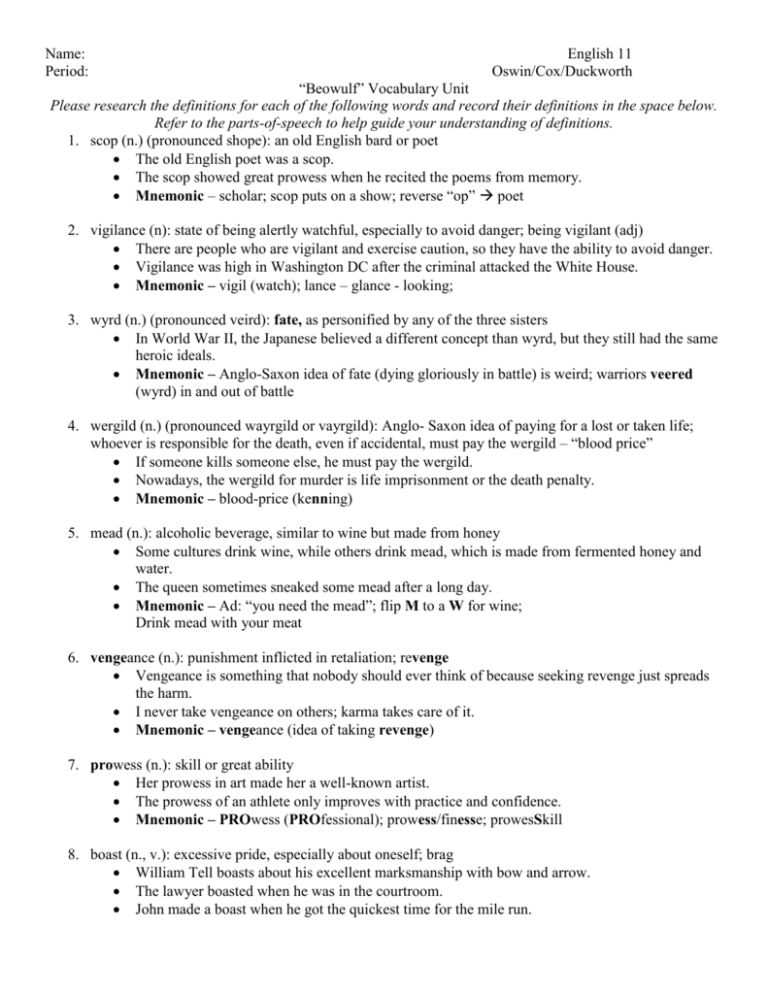
Name: Period: English 11 Oswin/Cox/Duckworth “Beowulf” Vocabulary Unit Please research the definitions for each of the following words and record their definitions in the space below. Refer to the parts-of-speech to help guide your understanding of definitions. 1. scop (n.) (pronounced shope): an old English bard or poet The old English poet was a scop. The scop showed great prowess when he recited the poems from memory. Mnemonic – scholar; scop puts on a show; reverse “op” poet 2. vigilance (n): state of being alertly watchful, especially to avoid danger; being vigilant (adj) There are people who are vigilant and exercise caution, so they have the ability to avoid danger. Vigilance was high in Washington DC after the criminal attacked the White House. Mnemonic – vigil (watch); lance – glance - looking; 3. wyrd (n.) (pronounced veird): fate, as personified by any of the three sisters In World War II, the Japanese believed a different concept than wyrd, but they still had the same heroic ideals. Mnemonic – Anglo-Saxon idea of fate (dying gloriously in battle) is weird; warriors veered (wyrd) in and out of battle 4. wergild (n.) (pronounced wayrgild or vayrgild): Anglo- Saxon idea of paying for a lost or taken life; whoever is responsible for the death, even if accidental, must pay the wergild – “blood price” If someone kills someone else, he must pay the wergild. Nowadays, the wergild for murder is life imprisonment or the death penalty. Mnemonic – blood-price (kenning) 5. mead (n.): alcoholic beverage, similar to wine but made from honey Some cultures drink wine, while others drink mead, which is made from fermented honey and water. The queen sometimes sneaked some mead after a long day. Mnemonic – Ad: “you need the mead”; flip M to a W for wine; Drink mead with your meat 6. vengeance (n.): punishment inflicted in retaliation; revenge Vengeance is something that nobody should ever think of because seeking revenge just spreads the harm. I never take vengeance on others; karma takes care of it. Mnemonic – vengeance (idea of taking revenge) 7. prowess (n.): skill or great ability Her prowess in art made her a well-known artist. The prowess of an athlete only improves with practice and confidence. Mnemonic – PROwess (PROfessional); prowess/finesse; prowesSkill 8. boast (n., v.): excessive pride, especially about oneself; brag William Tell boasts about his excellent marksmanship with bow and arrow. The lawyer boasted when he was in the courtroom. John made a boast when he got the quickest time for the mile run. Name: Period: English 11 Oswin/Cox/Duckworth Mnemonic – Everyone should toast you because you are so great; brag/boast; roast/boast; My mother boasts of her roast. 9. hoard (n., v.): a) a large amount of something, maybe valuable, that is kept hidden; b) to collect a great amount of something On the show “Hoarders,” people store everything and refuse to throw anything out. My father hoards old tools. The dragon guarded his treasure; the hoard was full of gold and jewels. Mnemonic – Hoarders on TV; hoard in one’s house 10. transience (n): quality or state of being temporary; something that lasts for a short time; the brevity of life (fate) Having a lot of money is transient because having money means one is inclined to spend it. Rainbows tend to be transient because they don’t linger long. Transience is evident in the poem “Ozymandias” by Shelley. Mnemonic – The hawk’s perch is transient; trans – moving; in and out of a trance; translucent (see through) 11. epithet (n.): (literary device) – two hyphenated words that describe something (used as an adjective) people-missing, fast-running, much-loved, yellow-belly, finger-lickin’, Sponge Bob-watching Examples: strong-armed, middle-class, long-legged, bright-eyed Mnemonic – epi-thet (adjective) device; Epithet/Adjective 12. kenning (n): (literary term) – two hyphenated words that take the place of a noun (used as a noun) Examples: book-holder, monster-killer, word-writer, animal-lover, Sponge Bob-watcher, people-misser, In Lord of the Flies, Simon is a pig-talker. A “whale-road” in Beowulf is the ocean. Mnemonic – kenn-ing; keNNing (NouN) 13. Code of Honor (n.): loyalty of the men to their king, and the king rewarding the men for their courage His Code of Honor represented the loyalty to his king. The knight embraced a Code of Honor because of his prowess in battle. The soldiers received an award from the king for showing compliance with the Code of Honor. Mnemonic – CHivalry; loyalty and Courage 14. Oral Tradition (n.): community tradition/historical information passed down by word of mouth An oral tradition is parents passing down stories to their children. Mnemonic – oral (by mouth); talking; oral tradition (trading stories by word of mouth) 15. epic (n., adj.): (n) – long story or poem, usually performed in the Oral Tradition; (adj) - great, awesome That epic moment in life is when you succeed. The epics were performed by scops in the oral tradition while the thanes drank mead while boasting about their prowess in battle. Mnemonic – epic (E+pic – Excellent pictures that are shown in epic poems/movies) 16. thane (n.): Anglo-Saxon soldier who serves the king Mnemonic – soldier; thank a thane for his service Name: English 11 Period: Oswin/Cox/Duckworth 17. grapple (v.): a hand-to-hand struggle or combat; physical combat The grappling between men Watching the boys grapple over the last GTA5 was entertaining. Mnemonic – grapple/grab – hand-to-hand combat 18. purge (v.): to cleanse or removing the bad from something; to purify The boy went to confession to purge himself of sin. Mnemonic – purge/puke; PURify - PURE 19. moor (n.): broad, open land that is swampy and dangerous When the farmer learned that he has purchased a moor instead of a field fit for farming, he was extremely disappointed. Mnemonic – moor/poor for farming; moor/mud; walking in the moor will give you more than you were bargaining for 20. infamous (adj.): famous for doing something bad Mnemonic – famine/infamous – bad; infamous Lindsay Lohan/Charlie Sheen
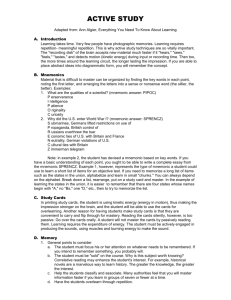
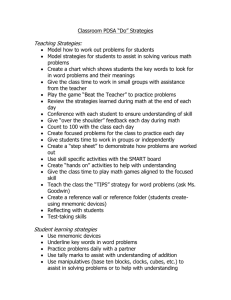
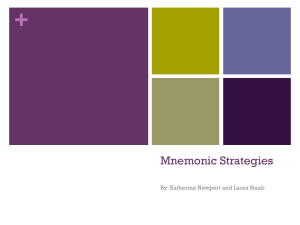
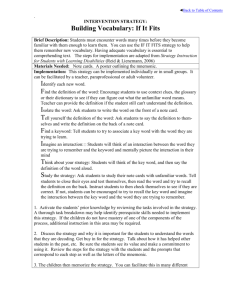
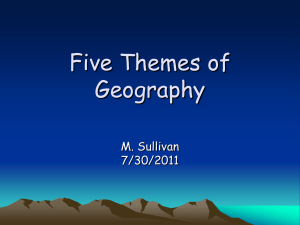
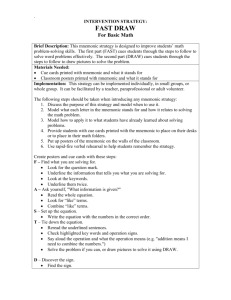
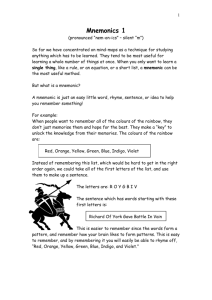
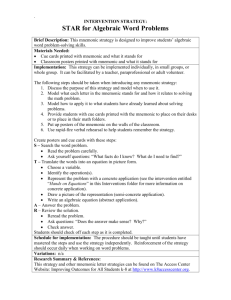
![Memory and Concentration [PPT]](http://s2.studylib.net/store/data/005229782_1-4c0c5b1e43659ea26205e374b2b31a91-300x300.png)